White Papers
Application of Ozone for Enhancing the Microbiological Safety and Quality of Foods: A Review
Jin-Gab Kim, Ahmed E. Yousef, and Sandhya Dave, February 1999
Water Relations in Harvested Fresh Produce
The Postharvest Education Foundation (PEF), May 2015
Microflora Changes in Misted and Nonmisted Broccoli at Refrigerated Storage Temperatures
Faridah Mohd-Som, L. Art Spomer, Scott E. Martin and Shelly J. Schmidt
Misting Affects Market Quality and Enzyme Activity of Broccoli During Retail Storage
M.M. Barth, A.K. Perry, S.J. Schmidt, and B.P. Klein
Misting Effects on Ascorbic Acid Retention in Broccoli During Cabinet Display
M.M. Barth, A.K. Perry, S.J. Schmidt, and B.P. Klein
Effect of Relative Humidity on the Ripening Behaviour and Quality of Ethylene Treated Banana Fruit
Saeed Ahmad, Zia Ahmad Chatha, Muhammad Akram Nasir, Abdul Aziz and Malik Mohson
Paul Muraca, Janet E. Stout, and Victor L. Yu
Humidification of unwrapped chilled meat on retail display using an ultrasonic fogging system
Tim Brown, Janet E. L. Corry and Judith A. Evans
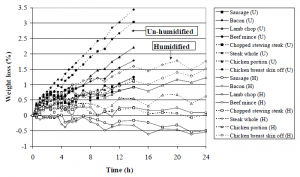
Meat Refrigeration, chapter 11: Chilled and frozen retail display
S.J. James and C. James
The performance requirements and specifications of a cabinet need to be defined in advance, to determine the cabinet’s fitness for purpose…
In general:
1. It is essential to maintain relative humidity in display cabinets of at least 85% or above to achieve display periods for unwrapped meat and meat products of 6–9 h.
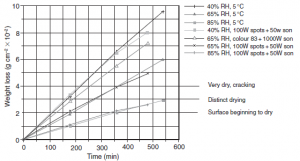
Case Studies
VaporDryHP saves Weis Markets over $50,000 annually
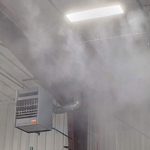
Overview: Weis Markets, a prominent regional grocery chain, sought a more efficient and sanitary method to maintain optimal humidity in the produce aisle of one of its distribution centers. Traditionally reliant on open ice beds to preserve produce freshness, the operation was incurring significant labor and material costs. Corrigan’s VaporDryHP high-pressure humidification system offered a cleaner, automated alternative—reducing operational costs while maintaining ideal humidity levels for produce storage.
The Challenge: At Weis Markets’ distribution center, the produce wet aisle depended on open ice beds to create a humid environment necessary to prevent produce shrink. While effective, this traditional approach came at a high cost—requiring continual ice production and manual replenishment. The process was labor-intensive and resource-heavy. Weis needed a solution that could maintain high humidity levels in a high-ceiling warehouse setting, without excessive maintenance or energy use.
The Approach: Corrigan recommended the VaporDryHP system, a high-pressure misting solution engineered for precise humidity control in large spaces. Ideal for high ceilings, VaporDryHP delivers a fine mist without wetting surfaces and operates without a compressor, offering 90% greater energy efficiency than traditional steam-based systems. The system includes advanced humidity and temperature transmitters with ±1.3% accuracy, capable of integrating with existing environmental controls and providing stable, long-term measurements even under continuous high-humidity conditions.
The Solution & Results: VaporDryHP was installed in Weis Markets’ produce wet aisle, replacing the labor-intensive ice bed method. The low-profile stainless steel mist bars delivered ultra-fine mist consistently across the space without wetting the floors. The system maintains high humidity levels critical for produce preservation—typically around 90–95% RH. Automated controls ensured ongoing reliability with minimal maintenance. The results were immediate: Weis eliminated the recurring costs of ice and associated labor, saving approximately $50,000 annually. In addition to the operational savings, the system provided a cleaner, more sustainable environment for produce storage, aligning with Weis Markets’ quality and efficiency goals.
Meat Processing Case Study
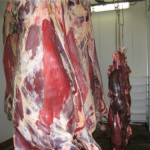
The problem: Costly shrink was occurring during the 24 hour primary chilling process, where fresh carcasses are spaced in a room designed to slowly reduce the core temperature. Corrigan was asked to maintain carcass weight while eliminating the moisture that had previously collected on walls and dripped from the cooler ceiling.
High relative humidity levels are needed to help with carcass weight loss and ensure quality chilling time.
The solution: A dry fog with droplets that are so small they bounce off surfaces and are quickly absorbed in the atmosphere raising relative humidity to the 90% RH set-point.
The result: The VaporDry™ warehouse humidity system reduced the carcass shrink from 3.0% to 1.5%. That’s a savings of $40.50 per hide on a 900 pound beef carcass valued at $3.00 per pound. The system paid for itself in two weeks! And no moisture collected on the ceilings or walls.
Open Seafood Case Issues and Solution
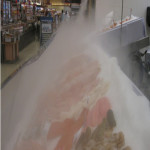
The design of open seafood cases is appealing to the shopper. Sleek, minimalistic and definitely open.
Trying to keep seafood presentable and fresh has always been a challenge. The drying effects of refrigeration on seafood is well known. Open seafood cases which readily allow water to evaporate into the drier surrounding air, have only compounded this difficult issue.
Fortunately, Corrigan Corporation has an open case solution that promotes longer shelf-life, reduces shrink and can even eliminate the need for ice.
Our nozzle design emits a controlled micron-sized water vapor resulting in a gently rolling fog. We strategically place the nozzle above the open case allowing the fog to cascade downward onto the seafood display area. Lastly, we control the system inlet air and water pressures as well as the on/off time to maintain the required relative humidity to maximize your seafood shelf-life.
The result is an esthetically pleasing open seafood case with a fog cover providing an overall fresher display.
Our customers’ report: it’s a real show stopper. Shoppers see the cloud from the other end of the store and are instantly attracted to the display.
